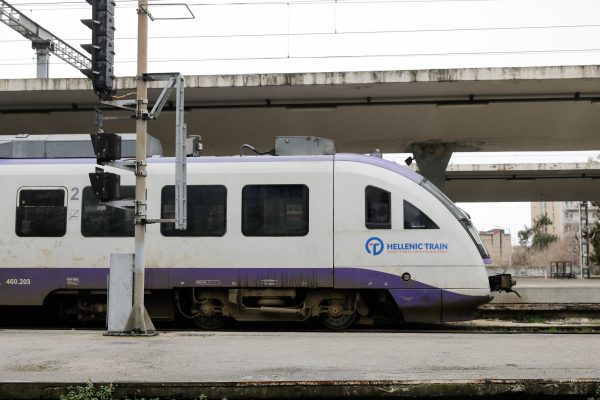
With limited itineraries, lower speeds, fewer trains and stops and mandatory two stationmasters per shift at each station, the railway will be restarted after the tragic accident in Tempi. A basic condition for passenger services to start by the end of the month is to find a common ground with the workers, who rightly ask for increased safeguards to get back on the trains.
The decisive meeting of the railways with the Minister of State, who has been responsible for Infrastructure and Transport since a week ago, Mr. Giorgos Gerapetritis, will finally take place this afternoon, although it was originally scheduled for Friday. It will depend on when and under what conditions this transitional phase will begin, even if numbly, as Mr. Gerapetritis characterized it yesterday during the more than two-hour press conference he gave.
The network at the scene of the accident was not damaged, while the electric drive remains to be reconnected, which practically does not hinder the movement since it routes can be serviced by diesel engines. An immediate priority is, according to information, the attempt to reopen the Athens Suburban Railway and the freight trains along the entire axis, which are extremely limited anyway.
The completion of the projects and what happens until then
As the minister explained, the intention of all parties involved is to resume the routes as quickly as possible with the necessary safety conditions, because if the train is out of service for months then it is effectively abolished. He also referred to the risk of vandalism and theft that would devalue the railway if I extended it.
After all, the copper mafia was also 12-13 years ago one of the reasons that the systems that had been installed hit rock bottom and never recovered. In this field, a bill is expected to come to Parliament in the near future that will tighten the framework in terms of sabotage, theft and damage done on the railway network.
As for the disputed contract 717, which will complete the project of upgrading and completing the signaling and remote control systems on the Athens-Thessaloniki-Promahonas axis, after a three-month extension, it is expected to be completed at the end of September. It was explained, in fact, that the expansion in question was deemed necessary due to shortages in basic materials, mainly copper and consumables, due to the problems in the supply chain caused by the coronavirus and the war in Ukraine.
However, there is one more decisive contract open to the network, ERGOSE’s 635 regarding the installation of ETCS, this one according to the schedule will be completed at the end of 2023. Because these two “never-ending” contracts will fill the gaps in the network’s security systems, it remains unclear how long this so-called interval of limited train operation will ultimately last. Because in addition to the installation of the systems, trial operation and staff training are required.
Coordination with Hellenic Train and compensations
Another parameter of the restart is the operating company, Hellenic Train, the coordination with which will determine the basic framework for the safe restart of the trains. As Mr. Gerapetritis said, from the talks so far this framework has been agreed upon, while issues of more specific conditions will be determined later, such as the number of routes, trains, employees.
What remains a gray area is whether the private company, owned by Italian group FSI, will raise issues of compensation for both the days the network remains closed and the reduced transport work. Regarding the issue of compensations, Mr. Gerapetritis noted that from the side of the Greek State there is an understanding that such an issue will not be raised and for this reason the agreements for the transitional period are being made.
In any case, this discussion is not going to open so fresh the national calamity and the investigation of the accident still in progress, both in terms of the administrative part and the criminal one. However, depending on the investigations into the company’s culpability or non-culpability, it cannot be ruled out that Hellenic Train will also examine the possibilities for compensation later.
In the meantime, the company announced that it will not activate, as it had the possibility under a relevant regulation, its exemption from the obligation to advance a part of the compensation to the families of the victims and the injured.
The agreement of the Greek State with Hellenic Train to serve the so-called barren railway lines, including the Athens-Thessaloniki axis, provides for an annual compensation of 50 million euros (without VAT) for 10 + 5 years. As the minister noted, yesterday, defending this agreement, he emphasized that although it is a mandatory public service, it includes compensatory issues.
“Studying the contract, I find that 80% of the money that is paid goes back to the OSE and ERGOSE companies as a result and, for the first time, it is foreseen that 20% from the profits of the operator, i.e. from Hellenic Train will be received by the Greek State,” he said, guaranteeing the strict attitude of the government towards the company’s relationship with the State. It should be noted that in the contract for YGOS, there is also a guaranteed minimum income for the company of 2 million euros.
What is on the table for the future
The main issue to get the trains on the tracks is clearly the increase in the staff of the railway operators, especially the OSE, who were cut down in the crisis through redeployments and retirements. According to the information given yesterday by Mr. Gerapetritis, approximately 200 people have been hired with service vouchers to cover immediate needs, of which 69 switchguards, 73 station masters, 60 technicians.
Also, for 2021, the recruitment of 117 people who will staff OSE, of which 36 are station masters, went ahead. The first phase of the relevant tender has been launched and is in the evaluation stage. 11,000 applications were submitted, and an additional 100 positions will be activated for 2022.
Given the changes in the network requirements that the new security systems will bring, as well as the formation of the new operational plans of OSE and ERGOSE, both the recruitment system and the training of the staff will be re-examined.
The issue is that with an organizational chart for the OSE that foresees 2,150 positions, of which around 750 are currently filled, the gradual entry of 417 people – almost half of them as private contractual labor – is a drop in the ocean.
Latest News

WTTC: Travel & Tourism to Create 4.5M New Jobs in EU by 2035
This year, international visitor spending is set to reach 573 billion euros, up by more than 11% year-on-year

IMF: US Tariffs Shake Global Economy, Outlook Downbeat
IMF slashes global growth forecast to 2.8% as U.S. tariffs create uncertainty and ‘negative supply shock

First Step Towards New Audiovisual Industry Hub in Drama
The project is set to contribute to the further development of Greece’s film industry and establish Drama as an audiovisual hub in the region

Airbnb Greece – Initial CoS Ruling Deems Tax Circular Unlawful
The case reached the Council of State following annulment applications filed by the Panhellenic Federation of Property Owners (POMIDA)

Mitsotakis Unveils €1 Billion Plan for Housing, Pensioners, Public investments
Greek Prime Minister Kyriakos Mitsotakis has announced a new set of economic support measures, worth 1 billion euros, aiming to provide financial relief to citizens.

Alter Ego Ventures Invests in Pioneering Gaming Company ‘Couch Heroes’
Alter Ego Ventures' participation in the share capital of Couch Heroes marks yet another investment by the Alter Ego Media Group in innovative companies with a focus on technology.

Corruption Still Plagues Greece’s Driving Tests
While traffic accidents continue to claim lives on Greek roads daily, irregularities and under-the-table dealings in the training and testing of new drivers remain disturbingly widespread

Pope Francis Died of Stroke and Heart Failure Vatican Confirms
As news of the official cause of death spread, tributes poured in from across the globe. The 1.4 billion-member Catholic Church is united in grief, remembering a pope who championed inclusion, justice, and compassion

Increase in Both Museum Visits, Revenues for 2024
As expected, the Acropolis was the top archeological site in the country, followed by Sounion, Mycenae, the ancient theater of Epidaurus, and Vergina in northern Greece

Where Greece’s Tourists Come From: A Look at 2025’s Top Visitor Markets
The United Kingdom continues to hold the top spot as the largest source of incoming tourism, with 5.6 million seats booked for Greece this summer — up 2.2% from last year. This accounts for 20% of all international air traffic to Greece
















![Ξενοδοχεία: Μεγάλο το ενδιαφέρον για επενδύσεις στην Ελλάδα – Η θέση της Αθήνας [γραφήματα]](https://www.ot.gr/wp-content/uploads/2025/03/Athens-hotels-90x90.jpg)
























 Αριθμός Πιστοποίησης
Αριθμός Πιστοποίησης